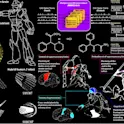
Health
26 Aug 2016
Treating babies in the womb for deadly diseases
New understanding of the immune system and stem cell technology gets scientists closer to treating deadly fetal diseases even before birth

Health
26 Aug 2016
New understanding of the immune system and stem cell technology gets scientists closer to treating deadly fetal diseases even before birth

Psychology
25 Aug 2016
“Who broke Grandma’s favorite vase?” As you listen to a chorus of “I don’t know” and “Not me,” how will you determine the culprit?

Humanities
25 Aug 2016
— By K.E.D. Coan Social media can disseminate critical information as well as unite disaster victims during their recovery efforts, suggests a study published in Frontiers in Communication. After natural disasters communities rely heavily on local governments to provide the necessary resources and information to respond to such disasters, but these approaches are not well equipped to meeting individual needs. As a complement to traditional methods, social media can provide a more personalized resource as well as fostering a sense of community in response to the crisis. “A relatively organized social media resource can go a long way to ensuring that people’s needs can be met;” said Douglas Paton, a professor of Psychology at Charles Darwin University and lead author of the study; “This is the first paper to explore whether people’s engagement through Facebook could translate into the development of more enduring, functional relationships.” Following a wildfire in Tasmania in 2013, the local community used a Facebook page developed by co-author Mel Irons, Tassie Fires – We Can Help, to relay details about disaster relief efforts and resources. The site also provided an opportunity for people to share their individual situations, needs, and reactions—and to connect with other people who […]

Neuroscience
24 Aug 2016
As scientists around the globe join efforts to understand brain function, we enter the era of Big Data and stir up debate on how science is done and how it can affect us all.

Life sciences
23 Aug 2016
Researchers read into the biological history of plants to reveal how plants will survive when birds and bees fly away.

Health
19 Aug 2016
After losing her husband to melanoma, Dr. Bettina Ryll was determined that something needed to change in the way patients and doctors communicated.

Neuroscience
18 Aug 2016
By Silvia Cardellino, Frontiers Augmentation of brain function is no longer just a theme of science fiction. Due to advances in neural sciences, it has become a matter of reality that a person may consider at some point in life, for example as a treatment of a neurodegenerative disease. Currently, several approaches offer enhancements for sensory, motor and cognitive brain functions, as well as for mood and emotions. Such enhancements may be achieved pharmacologically, using brain implants for recordings, stimulation and drug delivery, by employing brain-machine interfaces, or even by ablation of certain brain areas. This exciting area of research has been deeply explored with the Frontiers Research Topic “Augmentation of Brain Function: Facts, Fiction and Controversy”, hosted by Dr Mikhail Lebedev, Dr Ioan Opris and Dr Manuel Fernando Casanova in Frontiers in Systems Neuroscience. We asked Dr Lebedev to tell us more about this topic. How has this topic idea been developed? “It all started with an invitation letter mailed from Frontiers to Dr. Opris. (Dr. Opris and I co-authored a Frontiers article, which probably prompted that invitation.) The timing was good because Dr. Opris and I were discussing an idea of editing a book. As I work in […]

Health
18 Aug 2016
— by Emily Barker, Frontiersin.org Just ten-weeks of exercise is nearly 100% effective at protecting the heart from potentially lethal changes in heart rhythms. Professor George Billman, Field Chief Editor of Frontiers in Physiology, works on preventing ventricular fibrillation, a very specific and potentially lethal change in cardiac rhythm, since 1980. In his current work, he has found that exercise could be the best non-pharmacological way to protect our hearts after sudden cardiac arrest. During ventricular fibrillation the heart does not beat in a coordinated fashion, instead it is a disorganized electrical event. “This is what you will see when they call a code blue and bring in a defibrillator to try to restore a cardiac rhythm,” he explained. The heart receives two sets of nerves, the sympathetic and the parasympathetic. A change in cardiac rhythms can be found when there is high sympathetic activity and low parasympathetic activity. To find the best way to protect the heart, Prof. Billman and his research team induced animals with a sudden cardiac arrest. They then put some of the animals on a ten week training program. About 95% of those who exercised were protected at the end of the program, whereas the sedentary animals got worse over time. […]

Health
17 Aug 2016
We are delighted to announce Prof. Robert Gniadecki as our Specialty Chief Editor of the Dermatology Section in Frontiers in Medicine. Prof. Gniadecki (University of Alberta, Canada) is past President of the Danish Dermatological Society, a board member of the European Society of Dermatological Research and International Society of Cutaneous Lymphomas and serves on the editorial board of several journals. Prof. Gniadecki’s research focuses on translational aspects of cutaneous oncology with a focus on the pathogenesis and experimental therapy of cutaneous T-cell lymphomas and immunology of skin cancers. His clinical research areas include psoriasis, skin cancer risk, radiotherapy and phototherapy of cutaneous T-cell lymphomas. Prof. Gniadecki emphasizes the importance of dermatology in light of our improved understanding of the intricate interactions within the human body. He said: “Skin is the largest immunologically active organ in the human body and skin inflammation has profound effect on other tissues and organs, in particular the cardiovascular, endocrine and the central nervous system.” Furthermore, he underscores connections between dermatology and other medical disciplines and the importance of accounting for these to advance the field because “dermatology is deeply rooted in general medicine and skin diseases and cannot be fully understood without reference to other medical […]

Health
17 Aug 2016
by Emily Barker, Frontiersin.org Hospitalized patients could be at risk of weak bones and increased infections if physicians ignore signs of low-sodium in the body, known as hyponatremia. Scientists knew that hyponatremia caused swelling in the brain, however new research shows that the condition is actually systemic and affects all of the body. Hyponatremia can demineralize the bones causing osteopenia – weak bones – leading to increased risk of falls and fractures, it can also lead to greater risk of infection and cause sepsis. This is particularly dangerous for elderly patients. The sodium in the body is very tightly regulated in a very narrow range, certain illnesses can mean the body is unable to get rid of water properly causing the sodium level to get low. “When that happens water moves from outside of the cells to inside of the cells, but we are finding that low blood sodium alters cellular function so that cells do not function properly;” explained Dr. Michael Moritz, Field Chief Editor for Frontiers in Pediatrics, and Associate Editor for Nephrology in Frontiers in Medicine. Patients who are acutely ill have high vasopressin, which decreases their ability to get rid of water, increasing the risk of […]

Life sciences
16 Aug 2016
Frontiers in Marine Science is launching a new section on Physical Oceanography.

Psychology
16 Aug 2016
Scientists try to find out how many words we know.

Psychology
12 Aug 2016
New research shows that burnout is caused by a mismatch between a person’s subconscious needs and the opportunities and demands at the workplace. These results have implications for the prevention of job burnout. Imagine an accountant who is outgoing and seeks closeness in her social relationships, but whose job offers little scope for contact with colleagues or clients. Now imagine a manager, required to take responsibility for a team, but who does not enjoy taking center-stage or being in a leadership role. For both, there is a mismatch between their individual needs and the opportunities and demands at the workplace. A new study in the open-access journal Frontiers in Psychology shows that such mismatches put employees at risk of burnout. Burnout is a state of physical, emotional, and mental exhaustion from work, which results in a lack of motivation, low efficiency, and a helpless feeling. Its health effects include anxiety, cardiovascular disease, immune disorders, insomnia, and depression. The financial burden from absenteeism, employee turnover, reduced productivity, and medical, legal, and insurance expenses due to burnout and general work-related stress is staggering: for example, the American Institute of Stress estimates the total cost to American enterprises at 300 billion US$ per […]

Health
09 Aug 2016
The Mediterranean diet can improve your mind, as well your heart, shows a study published in the open-access journal Frontiers in Nutrition.

Neuroscience
08 Aug 2016
by Reeteka Sud, Frontiersin.org Hay fever may do more than give you a stuffy nose and itchy eyes — seasonal allergies may change the brain, says a study published in the open-access journal Frontiers in Cellular Neuroscience. Scientists found that brains of mice exposed to allergen actually produced more neurons than controls, they did this using a model of grass pollen allergy. The research team examined the hippocampus, the part of the brain responsible for forming new memories, and the site where neurons continue be formed throughout life. During an allergic reaction, there was an increase in the numbers of new neurons in the hippocampus, raising the question: what could be the consequences of allergies on memory? The formation and functioning of neurons is linked to the brain’s immune cells, the microglia. Scientists used to believe that immune cells are not active unless there is a threat such as injury or disease. That belief went out the window when it was discovered that microglia are in fact very active even in healthy brains, sculpting connections between neurons. The research team monitored the functioning of microglia in allergic animals. To the scientists surprise, they found that the same allergic reaction that kicks the […]
Get the latest research updates, subscribe to our newsletter